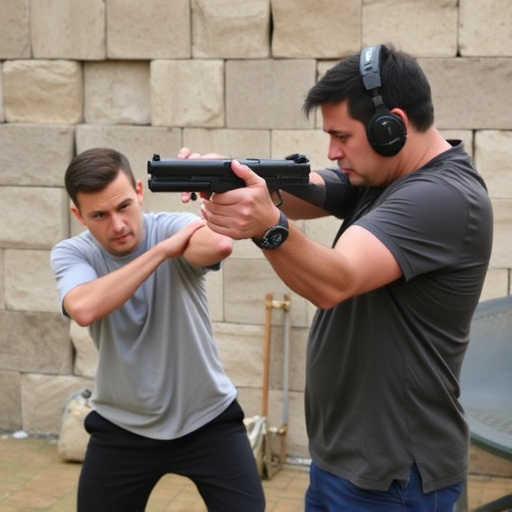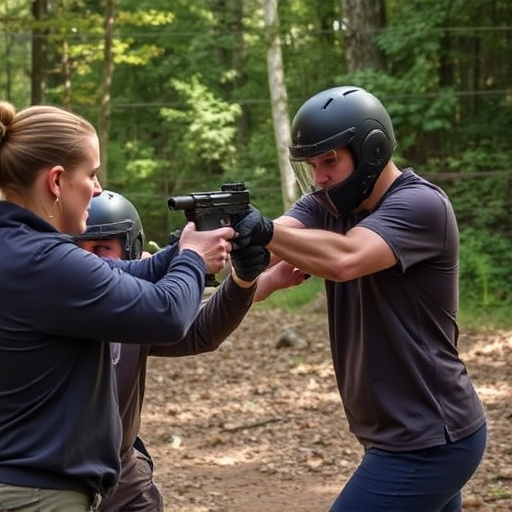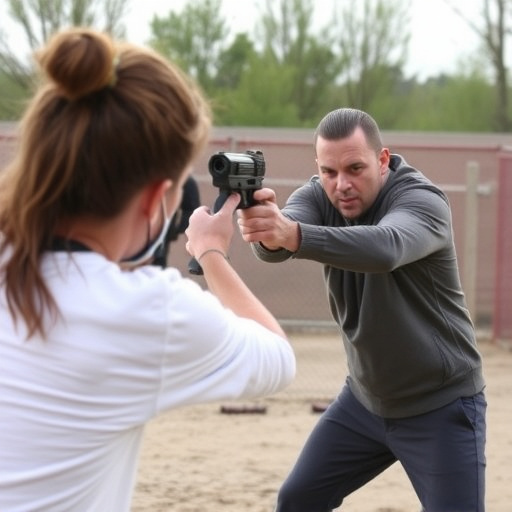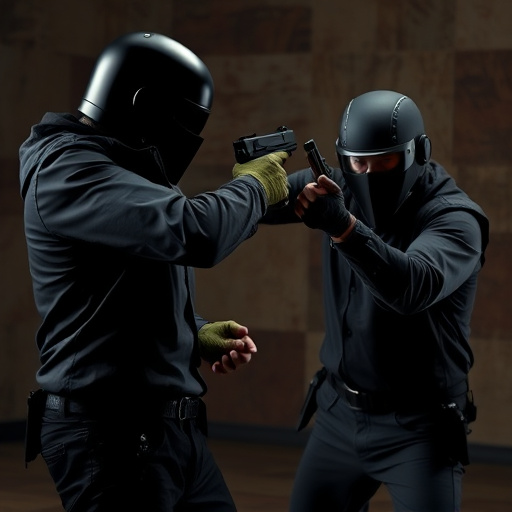This text compares stun guns and pepper spray as self-defense tools, focusing on their mechanisms, durations of effect, legal considerations, and suitability for different scenarios. Stun guns deliver electric shocks ideal for neutralizing armed attackers, while pepper spray causes temporary blindness and disorientation through eye and respiratory irritation. Regulations differ significantly: stun guns often require licenses or permits, whereas pepper spray restrictions are less stringent but may limit can size or restrict use to law enforcement. Understanding local laws, proper usage training, and device limitations are crucial for maximizing effectiveness and minimizing risks in self-defense preparation.
In today’s world, personal safety is a top priority. One popular self-defense tool gaining traction is the stun gun, but how do these differ from pepper spray? This article provides a comprehensive overview of stun gun regulations and their legalities across states. We explore the effectiveness of stun guns versus pepper spray, offering insights into which might be the better choice for self-protection. Dive into this guide to understand the nuances of concealed carry stun gun laws and make an informed decision regarding your safety.
- Stun Gun Regulations: A Comprehensive Overview
- Stun Guns vs Pepper Spray: Understanding the Differences in Effectiveness
- Navigating Legalities: Concealed Carry Stun Gun Laws State-by-State
Stun Gun Regulations: A Comprehensive Overview

Stun guns and pepper spray are both non-lethal self-defense tools, but they serve different purposes and have distinct regulations surrounding their use. When comparing stun gun vs. pepper spray effectiveness, it’s crucial to understand that each has its unique advantages and limitations. Pepper spray is designed to temporarily blind and disorient the target by irritating the eyes, nose, and respiratory system. It’s effective for a short duration, usually around 20-40 seconds, making it ideal for crowd control or escape scenarios. On the other hand, stun guns (also known as electroshock weapons) deliver a powerful electric shock that can immobilize an attacker for several minutes. This makes them more suitable for personal protection against armed assailants.
Regulations regarding concealed carry stun guns vary significantly across jurisdictions. Some states have strict bans on all non-lethal weapons, while others permit the carrying of stun guns with specific licenses or permits. Pepper spray regulations are generally less stringent, but certain areas may restrict the size of the can or limit its use to law enforcement only. It’s essential for individuals considering carrying a stun gun to research and understand local laws, as penalties for violations can be severe. Additionally, training and familiarization with the device’s proper usage are crucial to ensure effectiveness and minimize the risk of injury.
Stun Guns vs Pepper Spray: Understanding the Differences in Effectiveness

When it comes to personal defense, stun guns and pepper spray are two common tools considered by those seeking to protect themselves in various situations. However, understanding their differences in effectiveness is crucial for making an informed decision about which option aligns best with your needs. Stun guns emit an electric shock designed to temporarily incapacitate the target, rendering them defenseless for a few seconds. This method can be effective against larger or more aggressive assailants as it disrupts muscle control, allowing users to escape or gain assistance. On the other hand, pepper spray delivers a caustic chemical agent that irritates the eyes and respiratory system, causing the target to cough, tear up, and temporarily lose visibility. Pepper spray is generally considered more effective against multiple attackers since its effects are rapid and can disrupt even a group of assailants.
While stun guns offer a powerful but localized response, pepper spray provides a broader area of coverage, making it suitable for scenarios where quick disorientation of multiple opponents is required. The choice between the two depends on individual preferences, training level, and the types of threats one might face. It’s essential to consider factors like range, ease of use, and recovery time when deciding whether a stun gun or pepper spray is the more suitable self-defense mechanism.
Navigating Legalities: Concealed Carry Stun Gun Laws State-by-State

Navigating Legalities: Concealed Carry Stun Gun Laws State-by-State
The legal landscape surrounding concealed carry stun guns varies significantly from state to state in the U.S. Understanding these regulations is crucial for individuals considering carrying a stun gun for personal protection. Each state has its own set of rules and restrictions, which can differ based on factors like age requirements, permit systems, and specific areas where stun guns are permitted or banned. For instance, some states allow concealed carry without a permit, while others mandate strict licensing procedures.
When comparing stun guns to pepper spray in terms of effectiveness, it’s essential to consider the legal implications as well. Pepper spray is generally easier to procure and use due to less stringent regulations, making it a popular choice for self-defense. Stun guns, on the other hand, offer a more powerful electric shock that can incapacitate an assailant, but they are subject to stricter controls. Knowing your state’s specific laws regarding stun gun possession, hidden carry permits, and restrictions on where these devices can be used is paramount for responsible self-defense preparation.
In navigating the complex landscape of self-defense regulations, understanding the distinctions between stun guns and pepper spray is paramount. While each offers unique advantages, state-by-state variations in concealed carry laws necessitate thorough research before making an informed decision. When considering a stun gun versus pepper spray, evaluating their respective effectiveness, legal standing, and personal safety needs is crucial to ensuring compliance and maximizing peace of mind.
